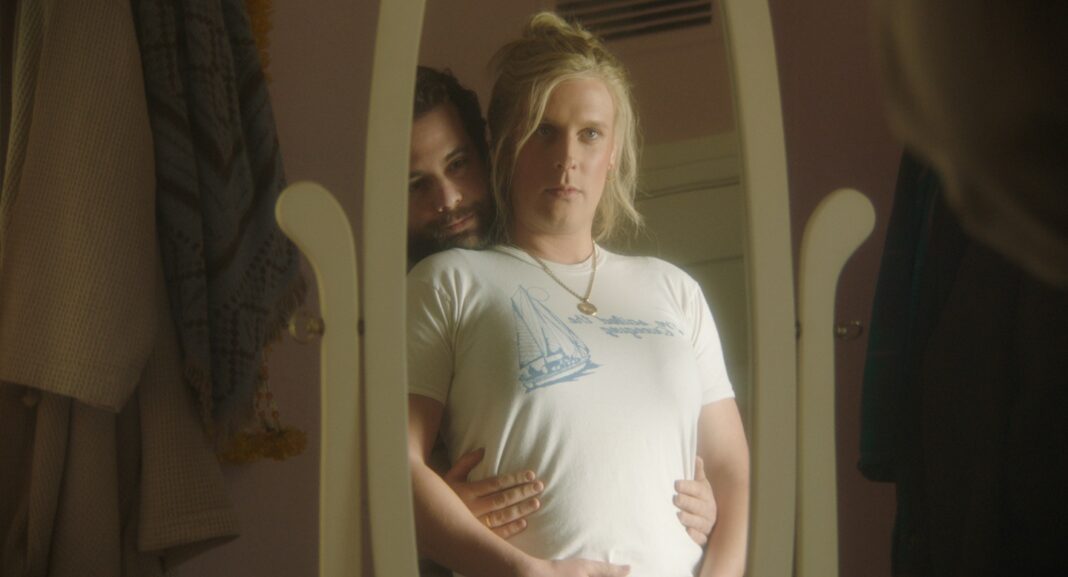There’s something about being in a band that makes people seem cooler than they might really be, and potentially more attractive to those in the audience. But being able to sing or play an instrument doesn’t necessarily mean a person possesses true substance, a hard lesson that may be quickly learned by those pining after airheaded musicians. Mile End Kicks sees the world through the eyes of one young music critic who still hasn’t had what she calls “actual sex,” learning over the course of one eventful summer that she should be the one in charge of her life rather than waiting for people around her to notice her and what she needs.
Grace (Barbie Ferreira) covers music for a magazine and website in the early 2010s in Toronto. She’s excited by the opportunity to spend the summer in Montreal, renting a room from Madeleine (Juliette Gariépy) and writing a book about Alanis Morisette. It turns out that Madeleine’s boyfriend Hugo (Robert Naylor) is in a band, and Grace sees multiple options to fulfill one of her summer goals. After good-natured guitarist Archie (Devon Bostick) tells her he’s celibate, she sets her sights on the much less sophisticated lead singer Chevy (Stanley Simons).
Mile End Kicks is the second feature film from writer-director Chandler Levack following I Like Movies, and it has a fitting home at the Toronto International Film Festival as a movie that begins in Toronto before transplanting itself to the much sexier city of Montreal. That’s how Grace sees it, certainly, though Archie talks about Toronto as the place that he’ll eventually need to end up when the band breaks up and they all have to get real jobs. Montreal is an escape, somewhere for Grace to spend formative time and fulfill her wish list, which also includes learning French, an aim that goes entirely unfulfilled due to a sincere lack of effort.
This film in many ways follows a typical romantic comedy formula but puts a few fun twists on it to make it feel unique. After meeting him, Grace almost immediately invites Archie up to have sex with her, in no uncertain terms, and his citation of “personal reasons” to explain him declining that offer doesn’t negate any feelings the two of them might have or later develop for each other. But for Grace, that’s enough to focus entirely on pursuing the clueless Chevy, spending precious time she should be using to write her book on attempting to check off something that she thinks is important. Madeleine’s early warning that Archie is the only member of the band she actually likes should clue Grace in enough to Chevy’s true nature, but of course that’s not the case at all and she has to learn the hard way.
Ferreira, who got her start on Euphoria, follows up a winning performance in Bob Trevino Likes It with another starring turn in an independent festival film, this time portraying someone who has much more self-confidence even if it might be unearned and is ready to go out and make mistakes. Grace is witty and funny, and Ferreira’s scenes with Bostick are among the film’s best. Gariépy is a welcome presence, showcasing what it’s like to live as an adult in Montreal and navigate a less complicated but equally prickly romance. The entire ensemble is fun and it’s clear that they’re having a good time.
Fans of music from this era will appreciate this film even more, and audiences are treated to multiple performances with uncomplicated lyrics but an undeniable rhythm and passion. It’s endearing, if sometimes disappointing, to follow Grace’s journey as she starts at a very high point and gradually slips repeatedly, never fully applying herself to the work she has to do and instead going through important life experiences that will benefit her later on rather than in the short term. This is a film that ends at exactly the right point, rightfully confident in the story it’s told, a refreshing and inviting look at youth, music, relationships, and Canadian culture.
Movie Rating: 8/10



